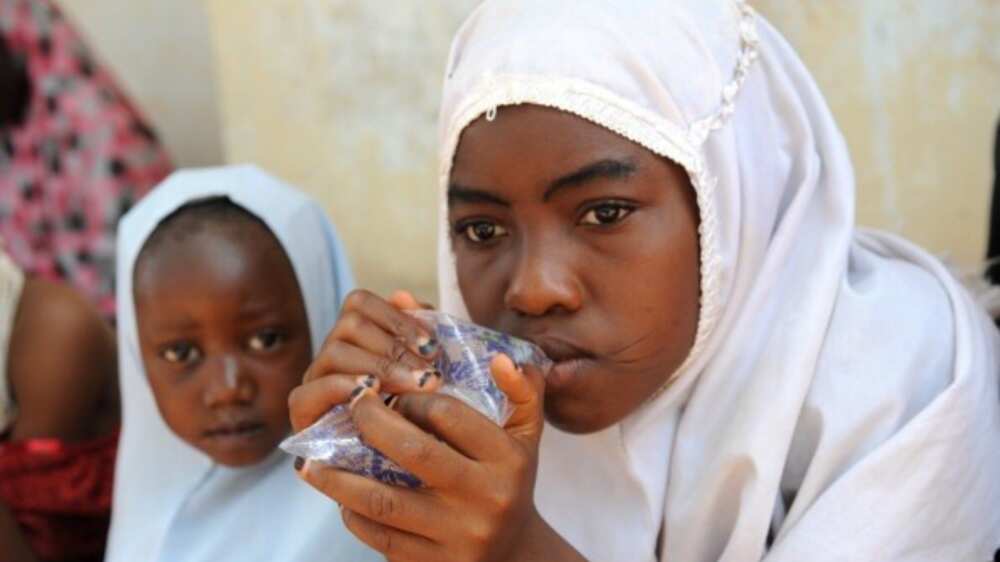Explainer: 4 Ways to Identify Fake Pure Water According to NAFDAC
The sachet water, popularly known as ‘Pure Water’ in Nigeria is reported to be the most popular source of drinking water in most cities and villages.
PAY ATTENTION: Click “See First” under the “Following” tab to see Legit.ng News on your Facebook News Feed!
In a 2013 report by Vanguard, a former Director-General, National Agency for Food and Drug Administration and Control (NAFDAC), Dr Paul Orhii, said "167 million Nigerians are taking it (pure water)".

Source: Getty Images
If 167 million Nigerians were estimated to be taking pure water in 2013, one can only imagine the number now.
The United Nations put Nigeria's current population at over 211 million. This means a very huge per cent of Nigerians take pure water. It is only very easily accessible, it is also the most affordable (though its price has also risen in recent times as the nation grapples with rising inflation).
According to the current DG of NAFDAC, Professor Mojisola Adeyeye, the packaged water industry is a multi-billion naira business that the agency takes seriously, not only because of the economic benefits but also due to its health importance.
Do you have a groundbreaking story you would like us to publish? Please reach us through info@corp.legit.ng!
Between January and August 2021, the NAFDAC DG said 2,153 new factories were registered, BBC News Pidgin reported.
It is thus very concerning that the widely patronised and burgeoning water industry is flooded with substandard products. This, to put it mildly, puts the lives of many Nigerians in danger.
NAFDAC, according to Professor Adeyeye, is doing all it can to curb the production of substandard packaged water.
The NAFDAC boss noted that between January and August 2021, 27 packaged water factories were shut down. She said the companies must follow the right manufacturing practices before they will be allowed to reopen for operations.
As NAFDAC is doing its own to curb the production of substandard packaged water, there are some signs you can also look out for to identify fake pure water, desist from taking it and report factories that produced it to NAFDAC.
Below are four things you should look out for, according to NAFDAC:
- No NAFDAC number
- Poor labelling
- Poor grammar
- Foul-smelling or bad-tasting
Professor Adeyeye advised Nigerians to be conscious of the kind of water they are drinking. According to her, any packaged water with poor labelling and bad grammar should not be bought because the implication is that such water does not pass through NAFDAC's certification.
Also, beyond the normal laboratory testing, when you drink water and it does not taste good in your mouth, there is a very strong chance that the water is not good.
Illegal producers
Professor Adeyeye also warned that NAFDAC will close down any water company that is found wanting of the following:
- No functional UV water steriliser/airconditioner
- No production manager
- Producing water with an expired license
- The appearance of algae on treatment plants
- Manual filling of bottle or jar
- Stacking pure water on the bare floor
- No changing of the micro filter at the right time
- Fake geological, fumigation and laboratory documents
- Malfunctioning hygiene station
The NAFDAC DG's warning was directed at the National Convention of the Association of Table Water Producers in Nigeria.
Abuja 'pure water’ producers announce major price increase, to sell at N20
Meanwhile, Nigerians living in Abuja will now have to pay N20 to purchase a sachet of pure water following the recent increase in the price of the product.
This was disclosed by the Association of Table Water Producers Association of Nigeria. The association explained that said they have imposed an increase due to rising production costs.
Legit.ng gathers that the FCT chapter chairman, Mohammed Akwuh, confirmed the development.
Source: Legit.ng



